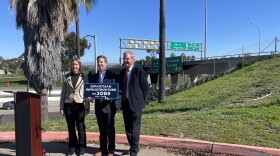At a two-day summit that opened Wednesday in Saudi Arabia, Arab leaders are expected to endorse Saudi King Abdullah's 2002 Arab-Israeli peace initiative, which contains key provisions rejected by Israel. Other issues, including Lebanon, Iran and Iraq, are likely to vie for attention at the gathering.
The summit is seen by many as confirmation that Saudi Arabia is moving into the role of leader among pro-western Arab states. The kingdom hasn't hosted a summit since 1976. But since the passing of King Fahd, King Abdullah has been slowly moving to take on a higher international profile.
The summit is expected to endorse Abdullah's 2002 initiative for ending the Arab-Israeli conflict. It proposes normalizing relations with the Jewish state once Israel relocates to its 1967 borders and permits the return of Palestinian refugees — two provisions Israel has rejected.
Western pressure is on Arab leaders to make the initiative a vehicle for negotiation. Some officials say the creation of working groups to discuss the initiative could provide a negotiating mechanism, if the conditions are right.
As he often does at Arab summits, Libyan leader Moammar Gadhafi provided the most acerbic commentary, although this time he did it from a distance. In an interview on Al-Jazeera television, Gadhafi accused the Arab leaders of "selling the Palestinians like sheep."
Beyond the Israeli-Palestinian issue, there are a series of crises demanding urgent attention. Saudi Arabia worked overnight to arrange a meeting Wednesday between United Nations Secretary-General Ban Ki-Moon and Sudanese President Omar al-Bashir on Darfur. And King Abdullah met Tuesday night with Syrian leader Bashar al-Assad on topics that were expected to include the governmental crisis in Lebanon.
Arab League Secretary-General Amr Moussa said an Arab Peace and Security Council has been ratified, and it will remain as a standing body that could muster Arab peacekeeping forces if necessary.
Speaking through a translator, he said: "We have absolutely to be ready, security-wise."
Many of the fears swirling around this summit have to do with Iran. Tehran is showing no signs of resolving its standoff with Britain after Iran seized 15 British sailors in what Britain insists were Iraqi waters. Iran also faces international sanctions over its nuclear program.
Khalil al-Khalil, a moderate writer who was appointed by King Abdullah to the Saudi consultative council, says Iran's behavior is reminding Arabs of the early days of the Shiite Islamic revolution nearly 30 years ago.
"Mahmoud Ahmadinejad (is) creating a lot of problems; unfortunately he came in the wrong time," al-Khalil said. "I'm sorry to say that, but ... that's what's happening."
Al-Khalil says Iran's tendency to wage its battles by proxy, assisting Shiite death squads in Iraq, for instance, is causing increased friction with Sunni-led Arab states.
'Also, Iran has been causing some major problems in Lebanon and also in Iraq, which is not acceptable. This is very, very clear," al-Khalil said. "I mean we can't accept that some armed groups are stronger, even threatening their countries themselves. Like Hezbollah in Lebanon."
But hard lines are being taken all over the region lately, including by the Bush administration. This week's summit is taking place as the U.S. military launches its largest show of force in the Persian Gulf since 2003, with maneuvers featuring two aircraft carrier groups backed by warplanes simulating attack maneuvers off the coast of Iran.
Copyright 2022 NPR. To see more, visit https://www.npr.org. 9(MDAzMjM2NDYzMDEyMzc1Njk5NjAxNzY3OQ001))






